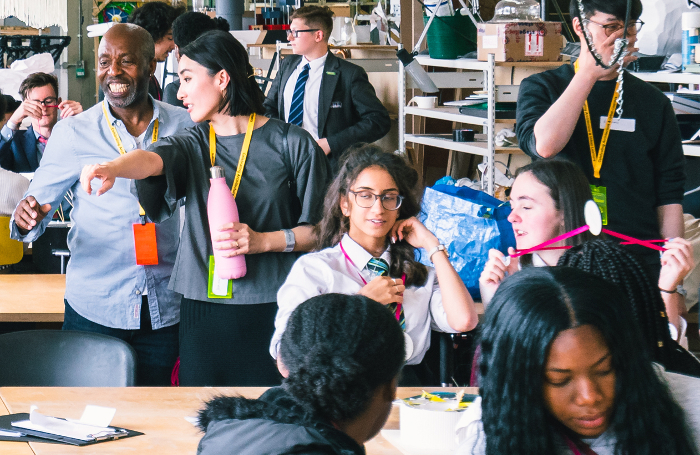"Responsible business makes good business sense," states Fiona Clark, Practice Director at David Miller Architects. This, she says, was one of the first things she realized in attending the Heart of the City foundation programme, which helps practices embed activities for social good into their core business strategy.
"Large corporations based in insurance and big finance acknowledge the benefits from a reputational point of view. Firms such as these do not spend money on things that don’t make business sense."
Several practices have participated in the programme. It offers a free year of talks, workshops and mentoring, wherein participants can learn from other committed companies about how they can make volunteering for social good part of their culture.
Many practices known for their outreach activities and responsible business culture credit the charitable initiative with helping them to develop and shape their corporate social responsibility programmes.
Wen Queck, partner at Cullinan Studio - where they prefer the term Responsible Business (RB) to CSR - says that Heart of the City has helped to make their activities more focused and more structured.
Gathering best practice and ideas helped the practice take a more strategic approach to their provision of work experience to aspiring architects. It turned ad hoc exercises into more formal local partnerships, with a local London borough and a with mental health charity, and it led to the introduction of one day of paid leave to employees for volunteering in ways that follow their own interests.
It also helped with reporting and tracking RB activities and helped inform the practice’s formalised Responsible Business Policy. HOTC offers a variety of model templates that can help businesses formulate their own policies.
The HOTC foundation programme runs for two years, with workshops and webinars and help in building networks for the first year, graduating to implementation and development of responsible business activities in the second year with the assistance of an experienced mentor.
The London-based programme with free places for eligible businesses in the first year and a fee of £800 (more for businesses with over 50 employees) for the second. The free places are courtesy of the City of London Corporation and City Bridge Trust.
Claire Pollock, who looks after ‘Partnerships’ - the preferred CSR term at Allford Hall Monaghan Morris (AHMM) - says that formalized CSR training has shown that many of the things already happening at the practice, such as schools’ outreach and charitable donations, could be brought into a more coherent strand of the business.
"The programme gave me the confidence to go to a director and emphasize the appetite for volunteering. Obviously there is a challenge in getting people away from their desks in a busy practice, but the programme helped me to mobilise staff for numerous different projects."

One important lesson, reveals Pollock, was identifying the ‘sweet spot’ for the business: working out what the practice is best placed to offer the outside world.
Local community action is the area that particularly appeals to her, and it can take many forms. For example, two Spanish-speaking architects at AHMM help older members of the South American community located on streets neighbouring the practice with accessing technology: from paying bills to introducing them to Google Maps in order to virtually ‘re-visit’ their home village.
On the more mainstream educational front, the practice has now established an education mentors’ group that can call upon some 50 architects. Volunteers tend to welcome the chance to do something different away from their desks, Pollock adds, so there is a huge staff wellbeing dividend too.
There are undoubted business benefits to CSR commitments, whether it is in attracting new skilled individuals or learning lessons in designing more sustainable buildings. CSR programmes are a great way to network with other responsible London businesses, from fintech to hospitality.
Social responsibility has always been embedded in David Miller Architects’ (DMA) culture. As the practice grew, it decided to formalise its CSR activities and learn how more experienced champions do it.
The outreach focus at DMA has been working with young people. They have partnerships and collaborations with schools and other organisations and offer apprenticeships, as well as work experience aimed at encouraging people from the broadest range of educational backgrounds. Pro bono work for community projects and volunteering are other commitments.
Such community-minded volunteering can raise a practice’s profile for all the right reasons. DMA has picked up a variety of awards for its efforts. In June it was awarded Global Good’s prestigious SME of the Year award and more recently was named as one of the top five companies for skilled volunteering by GivX, the online reporting tool that helps companies track and measure their social value.
HOTC applications are open now for 2020 (calendar year) and must be received by 29 November 2019.
Thanks to Wen Queck, Partner, Cullinan Studio; Claire Pollock, Partnerships, Allford Hall Monaghan Morris; Fiona Clark, Practice Director, David Miller Architects.
Text by Neal Morris. This is a Professional Feature edited by the RIBA Practice team. Send us your feedback and ideas
RIBA Core Curriculum Topic: Architecture for social purpose.
As part of the flexible RIBA CPD programme, Professional Features count as microlearning. See further information on the updated RIBA CPD Core Curriculum and on fulfilling your CPD requirements as an RIBA Chartered Member.









